双语:西方对于死亡的七种委婉说法
英语死亡的委婉说法

Death in English(死亡的委婉表达)be gone 去世了be among the missing 在去世人之中be no more 再也不存在了be in heaven 上西天be pushing up the daisies 命丧黄泉cross the great divide 跨进了阴曹地府finish off 完结depart this life 与世长辞gather home 回老家give up the ghost 见阎王了go out of this world 离开人间go the way of all flesh 逝世go the of nature 身故go to a better world 去极乐世界go to glory 上天堂go to heaven 归天,入天堂了go to the sunset 去阴间go to the ground 入地下go to sleep for ever 永远睡觉go west 归西kick the bucket 蹬腿了fall on sleep 沉睡fall asleep 长眠了lay one's bones 把一把骨头给扔了make one's exist 去世meet one's fate 天数尽了pass over 去世了pass away 离去,去世sleep the sleep that knows no waking 睡着就不醒了turn up one's toes 翘脚尖one's days on earth end 日子到头了。
“死”的委婉说法
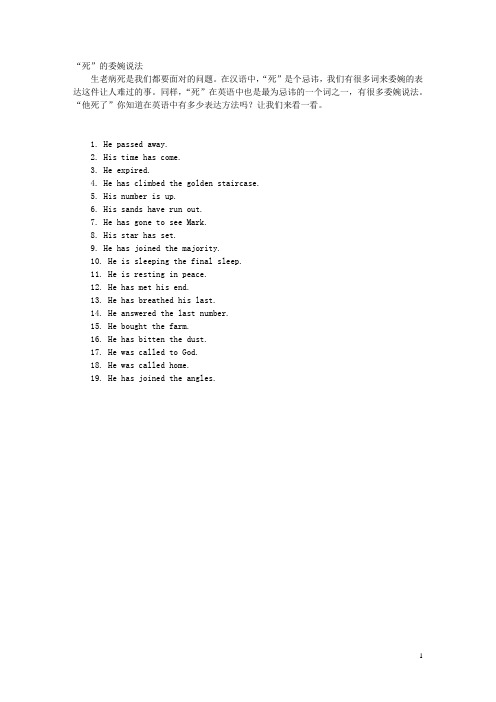
“死”的委婉说法
生老病死是我们都要面对的问题。
在汉语中,“死”是个忌讳,我们有很多词来委婉的表达这件让人难过的事。
同样,“死”在英语中也是最为忌讳的一个词之一,有很多委婉说法。
“他死了”你知道在英语中有多少表达方法吗?让我们来看一看。
1. He passed away.
2. His time has come.
3. He expired.
4. He has climbed the golden staircase.
5. His number is up.
6. His sands have run out.
7. He has gone to see Mark.
8. His star has set.
9. He has joined the majority.
10. He is sleeping the final sleep.
11. He is resting in peace.
12. He has met his end.
13. He has breathed his last.
14. He answered the last number.
15. He bought the farm.
16. He has bitten the dust.
17. He was called to God.
18. He was called home.
19. He has joined the angles.
1。
口语:英文中的委婉表达---表达死亡

【导语】我们中国⼈通常都很忌讳说"死"这个字,古代按照等级的划分有"天⼦死⽈崩,诸侯死⽈薨,⼤夫死⽈卒,⼠⽈不禄,庶⼈⽈死"的说法,现在我们会说⼀个⼈"离开了我们"、"⾛了"等。
英语同样忌⾔"死",虽然有die这个词,但⼝语中⼈们⼀般不⽤ die来直说死亡。
pass away和pass on都是暗指过世。
例:Sadly, Georgia's uncle passed away yesterday after a short illness(真伤⼼,乔治亚的叔叔昨天得了⼀场急病去世了);I'm sorry to learn that your dear mother has just passed on(很遗憾听到*妈刚刚去世的消息)。
lose one's life⼀般指由于意外事故、战争等不可抗⼒⽽造成的死亡,为意外死亡。
例:How did he lose his life(他是怎么死的)?depart也是死亡的委婉说法,主要⽤于短语depart this life/depart this earth,意思是灵魂离开了⾁体的存在去往另⼀个世界了。
例:He departed this world with a sense of having fulfilled his destiny(他带着⼀种已完成使命的满⾜感离开了这个世界)。
expire的意思是呼⽓,这⾥引申为呼出最后⼀⼝⽓,暗指死亡。
例:The patient expired early this morning(这位病⼈今天早晨去世了)。
perish多指⾮⾃然死亡。
例:Many soldiers perish in battle(很多⼠兵死于战争)。
go to meet one's Maker也是死亡的委婉说法,注意这⾥Maker要⼤写,是造物主的意思,去见造物主了就是死了。
委婉语

委婉语委婉语1.和死有关的委婉语不管在哪种文化中,人们普遍忌讳的词之一就是“死”。
当人们不得不提到它时,往往使用一些比较委婉、不那么刺耳的说法来代替。
于是,出现大量关于死的委婉语。
比如:to go to the heaven (上天堂去了);to go to a better world(到极乐世界去了):to go to another world (到另一个世界去了);to pay one’s debt to nature (向大自然还债了);to pass away (去世了);to be gone (走了);to breathe one’s last (咽气了);等等。
死对人们来说是一种不愉快的事情,用委婉语在陈述这一事实时多数用了比喻的手段,表达了人们的良好愿望,要去天堂,要去极乐世界。
另外,认为死是一种解脱,受完了罪还完了债,一切就了结了。
2.和疾病有关的委婉语死亡意味着向生者告别,是一件悲哀的事,然而和死亡相比,一些疾病也令人难过。
因此,直接谈论这些事往往被视为粗鲁和没礼貌。
艾滋病在西方社会已变成一种非常普通的疾病而又苦于没有治愈方法和控制的有效措施,人们谈之色变而避之不及,因此艾滋病被冠以社会疾病(social disease)。
对难以医治的癌症(cancer)人们称之为绝症(terminal illness) 或仅用字母 C 来替代。
其他疾病如麻风病(leprosy)被称为Hansen’s disease; 肺结核(tuberculosis )成了T.B; 狐臭(body odor)被称为B.O;变秘(constipation)被称为紊乱(irregularity);唑疮(acne)被称为问题皮肤(problem skin)。
而其它的性病(veneral disease)人们用V.D.来代替。
如果一个人疯了,就称他脑子有问题(soft in head), 或是不在状态(not all there)。
从英汉死亡委婉语看中西文化

从英汉死亡委婉语看中西文化
从英汉死亡委婉语看中西文化,可以看出中西文化之间有着巨大的差异。
英文中不乏夸张的死亡形容词,如“died a tragic death”,“succumbed to death”,“breathed his last”等。
而汉语中表达死亡的词语却更加委婉,如“过世”,“离开人世”,“死于”等。
死亡在中西文化中都是一个极具尊重的话题,但是在表达上有着明显的差异。
这种差异很可能源于两种文化对死亡的态度不同,以及宗教信仰的不同。
汉语委婉的表达方式往往令人感到温暖,而英文带有夸张气息却使人有一种恐惧的感觉。
同时,中西文化中的死亡委婉语更好地体现了两种文化对于生命的态度差异。
中国传统文化中更多的是理解生命的无常,强调生命的尊严和神圣性,认为生命是宝贵的,应当尊重荣辱。
而西方文化中更多的是把死亡当作一种自然现象去接受,认为生命是有限的,每个人都有生老病死的宿命。
因此,从英汉死亡委婉语可以看出,中西文化在很多方面存在着差异。
这种差异正是由于两种文化对待死亡的态度不同,以及宗教信仰的不同所造成的。
这种差异也蕴含着更深层次的文化内涵,既有古代的传统文化,又有现代的宗教信仰,能够为世界文化的交流提供更广泛的互动和对比。
对汉英语言中不同死亡委婉语的解读

对汉英语言中不同死亡委婉语的解读
对汉英语言中不同死亡委婉语的解读
关于死亡的委婉语不仅是一种在各民族间都存在的语言现象,也是一种社会现象及文化现象.在委婉语的运用中充分体现出中西文化的差异.英汉语族中死亡方面的委婉语各自蕴涵着其自身特定的文化意旨,特则是在等级观念、宗教信仰、民俗丧葬文化以及社会经济生活等方面所存在的差异都在这一委婉语中淋漓尽致的展现出来.
作者:雷静 LEI Jing 作者单位:国防科技大学,科技外语系,湖南,长沙,410073 刊名:安康师专学报英文刊名:JOURNAL OF ANKANG TEACHERS COLLEGE 年,卷(期): 2006 18(3) 分类号:G04 关键词:委婉语死亡委婉语文化差异跨文化交际。
死亡在英语中的的委婉语
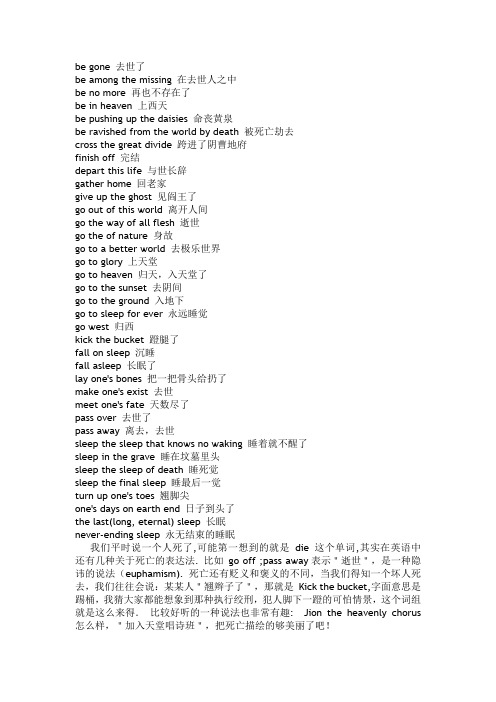
be gone 去世了be among the missing 在去世人之中be no more 再也不存在了be in heaven 上西天be pushing up the daisies 命丧黄泉be ravished from the world by death 被死亡劫去cross the great divide 跨进了阴曹地府finish off 完结depart this life 与世长辞gather home 回老家give up the ghost 见阎王了go out of this world 离开人间go the way of all flesh 逝世go the of nature 身故go to a better world 去极乐世界go to glory 上天堂go to heaven 归天,入天堂了go to the sunset 去阴间go to the ground 入地下go to sleep for ever 永远睡觉go west 归西kick the bucket 蹬腿了fall on sleep 沉睡fall asleep 长眠了lay one's bones 把一把骨头给扔了make one's exist 去世meet one's fate 天数尽了pass over 去世了pass away 离去,去世sleep the sleep that knows no waking 睡着就不醒了sleep in the grave 睡在坟墓里头sleep the sleep of death 睡死觉sleep the final sleep 睡最后一觉turn up one's toes 翘脚尖one's days on earth end 日子到头了the last(long, eternal) sleep 长眠never-ending sleep 永无结束的睡眠我们平时说一个人死了,可能第一想到的就是die 这个单词,其实在英语中还有几种关于死亡的表达法. 比如go off ;pass away表示"逝世",是一种隐讳的说法(euphamism). 死亡还有贬义和褒义的不同,当我们得知一个坏人死去,我们往往会说:某某人"翘辫子了",那就是Kick the bucket,字面意思是踢桶,我猜大家都能想象到那种执行绞刑,犯人脚下一蹬的可怕情景,这个词组就是这么来得.比较好听的一种说法也非常有趣:Jion the heavenly chorus 怎么样,"加入天堂唱诗班",把死亡描绘的够美丽了吧!。
从汉英语“死”的委婉表达看中西文化差异
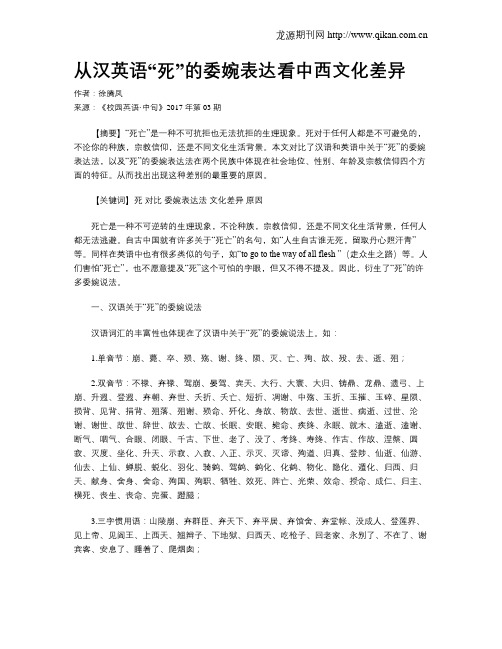
从汉英语“死”的委婉表达看中西文化差异作者:徐腾凤来源:《校园英语·中旬》2017年第03期【摘要】“死亡”是一种不可抗拒也无法抗拒的生理现象。
死对于任何人都是不可避免的,不论你的种族,宗教信仰,还是不同文化生活背景。
本文对比了汉语和英语中关于“死”的委婉表达法,以及“死”的委婉表达法在两个民族中体现在社会地位、性别、年龄及宗教信仰四个方面的特征。
从而找出出现这种差别的最重要的原因。
【关键词】死对比委婉表达法文化差异原因死亡是一种不可逆转的生理现象,不论种族,宗教信仰,还是不同文化生活背景,任何人都无法逃避。
自古中国就有许多关于“死亡”的名句,如“人生自古谁无死,留取丹心照汗青”等。
同样在英语中也有很多类似的句子,如“to go to the way of all flesh ”(走众生之路)等。
人们害怕“死亡”,也不愿意提及“死”这个可怕的字眼,但又不得不提及。
因此,衍生了“死”的许多委婉说法。
一、汉语关于“死”的委婉说法汉语词汇的丰富性也体现在了汉语中关于“死”的委婉说法上。
如:1.单音节:崩、薨、卒、殒、殇、谢、终、陨、灭、亡、殉、故、殁、去、逝、殂;2.双音节:不禄、弃禄、驾崩、晏驾、宾天、大行、大寰、大归、铸鼎、龙鼎、遗弓、上崩、升遐、登遐、弃朝、弃世、夭折、夭亡、短折、凋谢、中殇、玉折、玉摧、玉碎、星陨、损背、见背、捐背、殂落、殂谢、殒命、歼化、身故、物故、去世、逝世、病逝、过世、沦谢、谢世、故世、辞世、故去、亡故、长眠、安眠、毙命、疾终、永眠、就木、溘逝、溘谢、断气、咽气、合眼、闭眼、千古、下世、老了、没了、考终、寿终、作古、作故、涅槃、圆寂、灭度、坐化、升天、示寂、入寂、入正、示灭、灭谛、殉道、归真、登陟、仙逝、仙游、仙去、上仙、蝉脱、蜕化、羽化、骑鹤、驾鹤、鹤化、化鹤、物化、隐化、遁化、归西、归天、献身、舍身、舍命、殉国、殉职、牺牲、效死、阵亡、光荣、效命、授命、成仁、归主、横死、丧生、丧命、完蛋、蹬腿;3.三字惯用语:山陵崩、弃群臣、弃天下、弃平居、弃馆舍、弃堂帐、没成人、登莲界、见上帝、见阎王、上西天、翘辫子、下地狱、归西天、吃枪子、回老家、永别了、不在了、谢宾客、安息了、睡着了、爬烟囱;4.四字格:千秋万岁、龙御(驭)止宾、宫车晏驾、鼎湖龙去、命归黄泉、命丧黄泉、命赴黄泉、撒手人寰、玉楼受召、玉楼修记、地下修文、英年早逝、兰摧玉折、哲人其萎、玉陨香消、香消玉殒、红消香断、葬玉埋香、倩女离魂、珠沉璧碎、玉碎珠沉、离开人世、离开人间、不在人世、不在人间、寿终正寝、溘然长逝、杀身成仁、英勇就义、英勇牺牲、为国捐躯、以身许国、以身殉国、马革裹尸、舍生取义、肝脑涂地、千秋之旦、百年之后、一命呜呼、与世长辞、瑶池添座、见马克思;5.其他:流尽最后一滴血、到极乐世界、离开了我们、心脏停止了跳动、永远睡着了等等。
英语委婉语
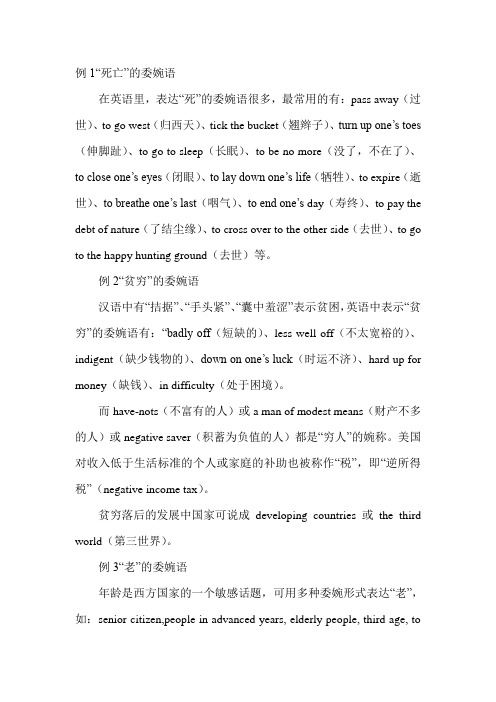
例1“死亡”的委婉语在英语里,表达“死”的委婉语很多,最常用的有:pass away(过世)、to go west(归西天)、tick the bucket(翘辫子)、turn up one’s toes (伸脚趾)、to go to sleep(长眠)、to be no more(没了,不在了)、to close one’s eyes(闭眼)、to lay down one’s life(牺牲)、to expire(逝世)、to breathe one’s last(咽气)、to end one’s day(寿终)、to pay the debt of nature(了结尘缘)、to cross over to the other side(去世)、to go to the happy hunting ground(去世)等。
例2“贫穷”的委婉语汉语中有“拮据”、“手头紧”、“囊中羞涩”表示贫困,英语中表示“贫穷”的委婉语有:“badly off(短缺的)、less well off(不太宽裕的)、indigent(缺少钱物的)、down on one’s luck(时运不济)、hard up for money(缺钱)、in difficulty(处于困境)。
而have-nots(不富有的人)或a man of modest means(财产不多的人)或negative saver(积蓄为负值的人)都是“穷人”的婉称。
美国对收入低于生活标准的个人或家庭的补助也被称作“税”,即“逆所得税”(negative income tax)。
贫穷落后的发展中国家可说成developing countries或the third world(第三世界)。
例3“老”的委婉语年龄是西方国家的一个敏感话题,可用多种委婉形式表达“老”,如:senior citizen,people in advanced years, elderly people, third age, tofeel one’s age, mature等。
英语死亡的委婉说法.doc

Death in English(死亡的委婉表达)be gone 去世了be among the missing 在去世人之中be no more 再也不存在了be in heaven 上西天be pushing up the daisies 命丧黄泉cross the great divide 跨进了阴曹地府finish off 完结depart this life 与世长辞gather home 回老家give up the ghost 见阎王了go out of this world 离开人间go the way of all flesh 逝世go the of nature 身故go to a better world 去极乐世界go to glory 上天堂go to heaven 归天,入天堂了go to the sunset 去阴间go to the ground 入地下go to sleep for ever 永远睡觉go west 归西kick the bucket 蹬腿了fall on sleep 沉睡fall asleep 长眠了lay one's bones 把一把骨头给扔了make one's exist 去世meet one's fate 天数尽了pass over 去世了pass away 离去,去世sleep the sleep that knows no waking 睡着就不醒了turn up one's toes 翘脚尖one's days on earth end 日子到头了放松心灵1.做一朵向日葵,面朝太阳,心纳阳光。
心,只要有了充盈的阳光,就不再那么的冰;人,也就不再那么的冷;拥有了热度,心也跟着有了温度。
2.你有最美的年纪,别辜负最好的自己。
3.我还是相信,星星会说话,石头会开花,穿过夏天的木栅栏和冬天的风雪过后,你终将抵达。
英语死亡的委婉说法.doc

Death in English(死亡的委婉表达)be gone 去世了be among the missing 在去世人之中be no more 再也不存在了be in heaven 上西天be pushing up the daisies 命丧黄泉cross the great divide 跨进了阴曹地府finish off 完结depart this life 与世长辞gather home 回老家give up the ghost 见阎王了go out of this world 离开人间go the way of all flesh 逝世go the of nature 身故go to a better world 去极乐世界go to glory 上天堂go to heaven 归天,入天堂了go to the sunset 去阴间go to the ground 入地下go to sleep for ever 永远睡觉go west 归西kick the bucket 蹬腿了fall on sleep 沉睡fall asleep 长眠了lay one's bones 把一把骨头给扔了make one's exist 去世meet one's fate 天数尽了pass over 去世了pass away 离去,去世sleep the sleep that knows no waking 睡着就不醒了turn up one's toes 翘脚尖one's days on earth end 日子到头了放松心灵1.做一朵向日葵,面朝太阳,心纳阳光。
心,只要有了充盈的阳光,就不再那么的冰;人,也就不再那么的冷;拥有了热度,心也跟着有了温度。
2.你有最美的年纪,别辜负最好的自己。
3.我还是相信,星星会说话,石头会开花,穿过夏天的木栅栏和冬天的风雪过后,你终将抵达。
美国文化中关于“死亡”的委婉语探讨
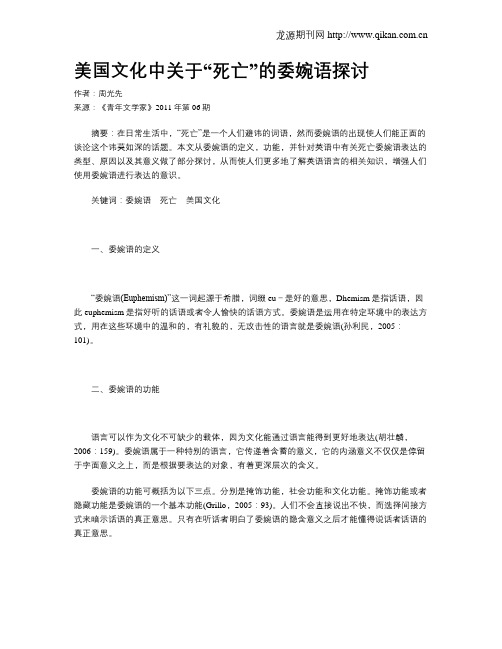
美国文化中关于“死亡”的委婉语探讨作者:周光先来源:《青年文学家》2011年第06期摘要:在日常生活中,“死亡”是一个人们避讳的词语,然而委婉语的出现使人们能正面的谈论这个讳莫如深的话题。
本文从委婉语的定义,功能,并针对英语中有关死亡委婉语表达的类型、原因以及其意义做了部分探讨,从而使人们更多地了解英语语言的相关知识,增强人们使用委婉语进行表达的意识。
关键词:委婉语死亡美国文化一、委婉语的定义“委婉语(Euphemism)”这一词起源于希腊,词缀eu-是好的意思,Dhemism是指话语,因此euphemism是指好听的话语或者令人愉快的话语方式。
委婉语是运用在特定环境中的表达方式,用在这些环境中的温和的,有礼貌的,无攻击性的语言就是委婉语(孙利民,2005:101)。
二、委婉语的功能语言可以作为文化不可缺少的载体,因为文化能通过语言能得到更好地表达(胡壮麟,2006:159)。
委婉语属于一种特别的语言,它传递着含蓄的意义,它的内涵意义不仅仅是停留于字面意义之上,而是根据要表达的对象,有着更深层次的含义。
委婉语的功能可概括为以下三点。
分别是掩饰功能,社会功能和文化功能。
掩饰功能或者隐藏功能是委婉语的一个基本功能(Grillo,2005:93)。
人们不会直接说出不快,而选择间接方式来暗示话语的真正意思。
只有在听话者明白了委婉语的隐含意义之后才能懂得说话者话语的真正意思。
同时,委婉语还作为测量身份地位的标尺在人们生活中起着非常重的作用。
一些受教育较少的人会直接说出粗俗不礼貌的话,因为他们不清楚委婉语的社会功能,从而会给听话者造成不快。
特定文化中的语言都有其特定的功能,语言是反映文化的一种方式。
委婉语也不例外,我们可以通过委婉语的使用来透视一个民族的文化。
认识委婉语的文化功能是透视一个民族文化的关键(Hudson,1980)。
一个经常使用直接语言的民族表明他们的文化中带有外向直爽的特征;而一个善于使用委婉语的民族其文化中必定带有某种程度的含蓄性。
【英语论文】论英语“死亡”的委婉语(英文)

On English “Death” Euphemism 论英语“死亡”的委婉语1.IntroductionEnglish euphemism, from the Greek word “euphemismos” meaning “good fame “or “good speech”, is the use of a pleasant, polite or harmless sounding word or expression to mask harsh, rude or infamous truths (Qin Xianmei &Li Yang, 2006: 212 ) . It is also defined in the new edition of The Oxford Concise Dictionary (1979) as “Substitution of mild or vague or roundabout expression for harsh or direct one” (Feng Cuihua, 2004: 221). English euphemism is a language phenomenon that exists popularly in English people’s liv es and the “death” euphemism is just one of the most important parts in euphemistic culture. During the process of communication, people, in English culture, create a great majority of euphe mistic expressions about “death” in order to make the “death” not sounding so scared. Of course, the “death” euphemism is both a language phenomenon and cultural phenomenon, which makes people avoid this terrible and mysterious word directly, and expresses their miss feeling and respect, their sympathy and comfort more effectively, which people can easily to accept. Death is an unfortunate thing and a disaster, even everyone in the world can not resist this natural law of birth, age and death. People merely use other words as substitutes of “death” for its linguistic taboo. People, from social man’ psychology, consider that talking about the death is unlucky, because in the mind of tradition, people refer to death and misfortune would occur. Therefore, many euphemisms in the English language are used to cover up “death”. For instance, in “David Copperfield”, Charles Dickens wrote: “and, it being low water, he went out with the tide.”(余立三,1985:63). “He went out with the tide” is a euphemism that expresses “he died”. To master this kind of euphemistic culture is good for social communication. This paper provides more detailed analysis from English “death” euphemism, its origin, development, metaphor, age vs. relationship, before or after death vs. dead cause, oral expression vs. slang, occasion vs. value. Meanwhile, it studies the culture on English “death” euphemism even deeply and helps the English learners understand the language’s in ner relations as well as how to improve the ability of using this euphemistic language effectively.2.English “Death” Euphemism and CultureCulture, in a broad sense, includes customs, ideas, objects, techniques, language, civilization, art and literature, etc. of a particular society or group of people. (Wehmeier, 2001:227). The English “death” euphemism is a special language. As we all know, England is a hometown of prevailing euphemism. People there are inclined to apply a lot of euphemistic words to express something terrible. As a story tells: a guest from Paris was travelling and living in England, one day, his landlord told him with grief on face: “My husband has just passed to the other side.” This Paris manlooked toward the other side of the garden, but he saw nobody and was puzzled at that time. So his landlord explained further to him: “I mean he is kicked the bucket.” He comforted her and said: “I hope his foot will be better soon.” But landlord did not understand what her guest said, and she ex plained: “No, he wasn’t here, he snuffed it ….you know.” Still the Paris man couldn’t get what his landlord wanted to express. He blurted out suddenly: “But you’ve got electricity here. (李观仪, 2000: 24). We can know from story why the Paris man answered this woman with other things that were outlying when she talked about one thing. Because the Paris man was not aware of euphemisms that the landlord used, even he did not understand “Conversat ional implication” of euphemism. As a matter of fact, what she said means that her husband passed away. In other words, her husband died. “Passed to the other side, kick the bucket, and snuffed it” these phrases in the story are all “death” euphemisms. Usually, people alive do not want to say the word “die” directly when someone acquainted has passed away. This language phenomenon in society is quite common, and in a sense, it is also an application of lang uage. English “death” euphemism, at the same time, reflects some custom, social value and belief, etc. Therefore, it can not exist alone without social culture. In order to analyze its inner cultural meanings, we now study the origi ns of English “death” euphemism first.2.1 The Main O rigin of “Death” EuphemismEverything in the world has their origins. So is with the English “death”euphemism. Long time ago, many phenomenon could not be explained clearly, just l ike “die”. People did not know why a man would die, but they believed it was a mysterious power. “Death” is a terrible word that reminds people of dark or cold things. People avoid talking about it, because they are afraid of losing their families or friends. Consequently, a lot of euphemisms are used, such as: “be asleep forever”(永远安息了)is taken to substitute “death” as well as the “ to be brought to one’s long home”(回老家). In different cultures, it needs to use the different euphemisms to express “death”. Namely, the origi ns of English “death” euphemism are so wide and different.2.1.1 Christianity BeliefThe first origin of “death” euphemism is Christianity belief. A large number of the euphemisms originate from the stories or allusions of Christianity. Moreover, Christianity has explained the death and described the world after death in order to help people get rid of angst and trepidation about death. To the world beyond death, Christianity has had great effects on people’s mind and obviously emerges in the language. We know, English, America, Canada, Australia and New Zealand are all the countries which believe in Christianity. Christianity is focused on the salvation of the world beyond death, and there are many “death”euphemisms are found in Bible, Hymns and preached documents, etc. Accordingly, a part of English “death”euphemisms originate from Christianity. In the Medieval Century, Christianity unified the whole Europe, and Bible was unique and supreme truth. The “death” euphemisms from Bible have embodied life value and explained people’s death. just as God creates human beings with clay, and after death, they would “return to dust” (归尘). In Bible, God created Adam, human beings’ ancestor, with clay. One day, God said to him: “Thou come from dust, and shalt return to dust.” The notion that people have s ins with birth, they must atone for it, and after their death, they would “pay the debt of nature”. God is a master of everything i n the universe. When people die, they “are called to God”. Death means “go the way of all flesh”. People alive, they must kee p noble mind and helping others, they would “go to heaven” in the future. And then, they can “be with God, be asleep in the arms of God / in Jesus / lie in Abraham’s bosom” and “be at peace”. This makes life “go to one’s final reward”. People’s death just is “yield up the ghost”, but the soul is “launch into eternity”and “have one’s name inscribed in the book of life”. (戴卫平&高鹏,2004:15).According to the Christianity, human beings are all created by God. They are God’s sons and daughters. God loves his children, and human also love God. But human have sins with birth, they must believe in and obey God, and God would absolve their sins. It can help them go to heaven after their death. By means of the influence of this mind, English “death” euphemisms, their original meanings are mostly about God and heaven. Some words like: “to answer the final summons, to depart to God, to join the heaven host, to join the angels, to be called to the great beyond and to be taken to paradise”, etc. These euphemisms are used to express the world after death and make people alive have a spiritual dependence, living quietly, and leaving with smile in the end.2.1.2 Funeral WayThe second origin o f English “death” euphemism is its funeral way. In English culture, funeral way al so has produced some “death” euphemisms, just as daisies. It is a kind of flower that usually grows in the place around a tomb. It symbolizes a man who died and has been buried into earth. The “death” euphemisms about daisies are “to count daisies, to grin at the daisy- roots, to hide one’s name under some daisies,to kick up daisies, to push up the daisies and to turn up one’s toes to daisies”, etc. (刘重德,2006: 438). Certainly, the funeral way in different situations has different euphemistic expressions.2.1.3 Professional Language“Professional language” is a third of English “death” euphemism. In many different professions of society, they have their own languages, and language expressions are endowed with the great professional characteristics. This paper discusses this question from six professional origins.Firstly, soldiery is a profession whose duty is to defend country’s security and fight against enemies. Looking back upon the passed history, many soldiers lost theiryoung lives in the wars. People, for the sake of remembering and expressing their respect to those who died for the nation, they used many “death” euphemisms. For example, President Lincoln gave an address in Gettysburg: “we have come to dedicate a portion of that field as a final resting place for those who here gave their lives that nation might live.” (包惠南,2001:184). In this sentence, Lincoln used the “final resting place” that is a “death” euphemism of burial ground, a nd “gave their lives” is a euphemism of sacrifice. These two “death” euphemisms greatly expressed Lincoln’s respect and love to these martyrs. Generally speaking, the “death” euphemisms about soldiery are expressed as “sb bit the dust, sb bought the farm, sb fell in battle, sb gave his life to his country / laid down his life for his country, do one’s bit for one’s country and fire one’s last shot”, etc.Secondly, reverend is also a profession whose task is to missionize and persuade people to accept God. They believe that people would be taken to paradise after their death. As a result, there are many “death” euphemisms about God or heave n, Such as: “to be called to God, to be gathered to one’s fathers, to go to meet one’s maker, to be in heaven, to be asleep in the arms of God and to depart to God”, etc. Consequently, these euphemisms emerge in religious language.Thirdly, doctor is a profession that they usually help the patients. Their duty is to cure diseases that have fallen on people. But sometimes, some patients died of diseases that can not be treated. As doctors, they have responsibilities to comfort these patients’ families or friends. They often say: “We have tried our best; we think she is going home”(毛荣贵等,2005:148), he expired, he breathe his last and he have gone out”, etc.Fourthly, seaman is a profession that they work on the sea. But this work is rather dangerous. No matter the fishermen or sailors, many of them died in the sea for some reasons. People called their death as “be lost at sea “, etc.Fifthly, lawyer is a profession that they use law to help or protect others’ benefits. When someone died of being killed without any evidences, lawyers often present at this occasion. They always say that “the deceased man left no will, the old man deceased without leaving an heir, the deceased was a well- know engineer”. Actually, “The deceased” means a dead man. It is an elegant, f ormal euphemism from Latin. For example, a dialogue in the teleplay of “Prison break”:“We made an imprint of the deceased’s teeth and compared them to the dental records of Terrence Steadman. And? They were a perfect match.”“Thank you, doctor. That can’t be Terrence Steadman”“If you like, you can bring in a forensic examiner of you own choosing to examine the body, but I can tell you now. They’ll come to the same conclusion that I have”.“I hope you’re proud of this. You’ve gotten your pound of flesh. Ar e you done now? or would you like to hurt my family some more? Come on”.(Prisonbreak, 2007).Finally, net player is a kind of people who like the plays on the internet. In the developed modern society, internet is getting more popular and has become the part ofpeople’s life. Thus, so many new words on the net are spoken by players. As for “death”, they call it “game over”.The “Game over” is just the “death” euphemism in network culture.2.2The Development of “Death” EuphemismEverything’s development has a process. So is with the Euphemism. In the time of religion popularity, people believed in God, because the so-called good life would be given under the blessing and protection of God. For this, euphemisms were endowed with religion meaning. On the contrary, in the days of advanced science and technology, people gradually open the natural mysteries, and the religion is neglected bit by bit. The new euphemisms without religion meaning can get development in the coming day. In terms of social consciousness’progress, it promotes the increase of euphemisms. In the 20th century, especially after World WarⅡ, many new euphemisms were created when the civil situation changed. (何善芬,2002;369-70). English “death” euphemisms also followed when euphemisms developed. I n the Medieval C entury, because of the famine and plague year after year, “Grim Reaper” became the substitute of “death” in that time. And in the Renaissance, people called the “death” as nap, sleep, and gave it human nature. As a result, the effigies of dead men were sculptured on tombs. From the Medieval Century to now, people have considered the “death” as a master gamesman. All of them want to defeat it, but eventually, they are failed. People’s life is like a gamble, if you fail, and your life will end at once. Hence, there are many “death” euphemisms about this aspect, such as “cashed in / handed in his chips and jumped the last hurdle”, etc. (戴卫平&高鹏,2004:19). With the development of science and technology, some English “death” euphemisms have hardly been used, because they have been the old phrases and been displaced by the new ones. Some new expressions like “mercy killing / stroke, pull the plug, pass out of the picture, be grounded for good and run one’s race”. “D eath” is regarded as the beginning of new life that is always expressed in several words, such as “go to a better place, be called to a higher life”, etc. Today, they are used widely by public.3.English “death” Euphemism and MetaphorMetaphor is a way of describing something by comparing it to something else which has the same qualities (but without using the words ‘as’ or ‘like’). (Wehmeier, 2001:582-83). In English culture, people’s concept that “when talking to the death, and the misfortune would happen”, is rooted in their mind deeply. Using the way of metaphor to express the “death” is to not mention it. Usually, “Death” is compared to “home, sleep, rest, time, going away and west”, etc. The metaphor a bout home: “to be called home, to be home and free, to go home, to go to one’s own plac e and to be brought to one’s last / long home”. For example, “George, I say to my apprentice, shut shop up. My old friend John Baines is going to his long home today”. (傅敬民等,2005:92). About sleep: “to sleep, be asleep forever, final sleep, to be asleep in the arms of God and to have fallen asleep”. In “Hamlet”, Shakespeare wrote: “To die, to sleep. No more; and by a sleep to say we end the heartache, and the thousand natural shocks that flesh is heir to”. (Luo Jinguo, 1996: 144). About rest: “go to rest, to have found rest, to rest in peace, to go to one’s resting place and to take one’s rest”. About going away: “to pass away, to fade away, to come to an end, to go off, to be gone and to lose”, etc. About time: “one’s time is at hand”. About west: “to the west”. East is a place that is considered as the sun rise and life birth. West, is a place the Sun set and life end. These expressions are all the euphemistic metaphor of “death”.4.English “Death” Euphemism and Ag e、RelationshipAccording to the different death ages, it is divided into four groups of people, “The old”, “The Mid-aged”, “The young” and “infancy”. Their expressions, base on the “death” euphemism, are different in English culture. The old, their death is expressed as: “to end one’s day, depart out of this world and curtains”, etc. The Mid-aged: “to be part from one’s life”. The young: “be taken in one prime”. Infancy: “come to or meet an untimely end and a sleep in Jesus”. For example: “Fallen asleep, not dead but sleeping, asleep in Jesus”. (a common child’s epitaph in the 19th century). (包惠南&包昂,2004:232). Likewise, Relationship is divided into six aspects. Such as: “friend, colleague, leader, kinsfolk, seniority and celebrity”. The “death” euphemism about friend is “join the great majority”. Colleague:for example, “My king has cancelled h is account, which is a great loss to us “. (毛荣贵等,2005:148). Leader: “depart from the world forever, to quit it”, etc. Kinsfolk: “the loved one, fell away, fell asleep and pass away / pass on (upon), etc. e.g. “I don’t know what I shall do when he comes to go”. (吕绍全,2007:88). Seniority: “be gone away, late, poor, curtains and to quit it”, e.g. “How wonderful”, she said: “My late husband love good music”. (88). Celebrity: F. Engels wrote for Marx’s death: “On the 14th of March, at a quarter to three in the afternoon, the greatest living thinker ceased to think. He had been left alone for scarcely two minutes, and when we came back we found him in his armchair, peacefully gone to sleep- but forever”. (包惠南,2001:184). We can see in this s entence, “ceased to think” and “gone to sleep- but forever”,they are all euphemisms of “died”. Engels used these two euphemisms was to completely express his esteem and miss feeling to Marx.5.English “Death” Euphemism and before or after death, Dead CauseDeath is classified into two parts, “before death” and “after death”. Before death means somebody is dying or approach to death. Some euphemisms about before death just like: “to be on one’s last leg, for example, “It i s Dopy, Mike,” said one, “park bum for twenty years. On his l ast leg, I guess.”(卢炳群,2003:73). “to have one foot in the grave”, e.g. “The young lady has married that old bookseller who has one foot in the grave. (73). “be sinking fast” and “to receive notice to quit”, e.g. “I wonder whyhe can be so cheerful when he knows he has notice to quit”. (74). some about after death: “he left us, he lost his life, he gave up the ghost, he began the world and he met his end”, etc. Why a man would die? And what reasons make people die? These questions attribute to three causes: “killing”, “be killed” and “suicide”. In the first pl ace, euphemisms about “killing”, like: “to finish sb, do for sb, knock off sb, slay sb, take one’s life and put away sb”, etc. (黄衡田,2001:91). In the second place, about “be killed”: “take one’s own life, be taken off, be knocked off and be done” (91). In the third place, about “suicide”: “destroy oneself” and “make away with oneself”, etc.6.English “Death” Euphemism and Oral expr ession, SlangNot only does the English “’death” euphemism appear in written forms, but also spoken forms. Thus, it has oral expressions and slangs. The oral expressions usually are:“be gone, be no more, breathe one’s last, close one’s eyes, join the majority and go to glory”, etc. These eup hemisms are still popular today, but it also reflects people’s old concept. Slangs, at the same time, such as “bump off sb, kick off shoes, cashed in one’s chips / checks, went off the hooks, handed in one’s dinner pail and received notice to quit”, etc. These expressio ns, their original meaning is not about death. But in the latter English culture, they develop and become the “death”euphemism in order to meet the need of social communication.7.English “Death” Euphemism and Occasion, ValueOn different occasions, people use different English “death” euphemisms. Now, there are two occasions: “the elegant” and “the plain”. On elegant occasions, people usually use euphemisms, like “with their father, do one’s bit and have found rest”. On plain occasions, people used like: “kick the bucket, drop off the hooks, slip off the hooks, hive up, yield up the ghost and be done for”, etc. These euphemisms can not be used at random at any time. If do so, mistakes will be made. For exa mple, “The minister kicked the bucket yesterday”. (毛荣贵等,2005:150). It is a great mistake that can easily cause misunderstanding. The minister is a leader of a country; his death should happen on the elegant occasion. But the “kick the bucket” is regarded as a satiric expression and is used consequently on the plain occasion. In this sentence, using the “kick the bucket” is a sarcasm and blame to the minister. In addition, English “death” euphemism also reflects value. In English culture, “death” euphemisms have no obvious classes; people believe everyone is all equal. Just as the description of a popular proverb that happened in Europe of the Medieval Century: “Popes, kings, beggars, and thieves alike must die”. In people’s heart, “to die” is “to go to the w ay of all flesh”. (戴卫平&高鹏,2004:17). Azrael has been personalized as “the great leveler”. It is focused on the psychic rest after death- realizing one’s dream. People always think about something from the religion, and hope their death can receive God’s gra nt and love, even being together with him. Even though they died for justice and truth, they are heroes; “death” just has finished the God’s plan: “savingothers”. This is the accordance with the basic criterion of religion doctrine. Thereby, the English “death” euphemisms from martial life are not given the pessimistic feeling in it. Such as “lay down one’s life, lay down with one’s shovel and hoe, kiss the dust, make the ultimate sacrifice, be present at the last roll all, be written off and fire one’s la st shot”, etc. (刘重德,2006:440).8.ConclusionIn short, we are living in a multi- language, intercultural world. People pay more attention to the correlation and influence between languages and cultures. The intuition and experience to culture help them make full use of words to express their desires. The “Death” euphemism in English culture is a most popular language phenomenon. The notion: “who refers to death and misfortune would fall on him”, has great effects on human cultural life. The English “death” e uphemism, its rich cultural communication manifests the trait of culture so lively and deeply, and have enriched people’s treasure house of languages with unique expression manner. Therefore, English “death” euphemisms are still worthy of doing further res earch and exploration. So long as we know the origin, the development, the occasions of English euphemism usage, we can avoid conflicts and communicate with each other effectively and properly.ReferencesLuo Jingguo, ed. A New Anthology of English Literature V olume Ⅰ, 北京:北京大学出版社,1996.包惠南著《文化语境与语言翻译》,北京:中国对外翻译出版公司,2001.傅敬民等编著《英汉翻译辨析》,北京:中国对外翻译出版公司,2005.卢炳群著《英汉辞格比较与唐诗英译散论》,青岛:青岛出版社,2003.刘重德主编《英汉语比较与翻译》,上海:上海外语教育出版社,2006.李观义主编《新编英语教程》第四册,上海:上海外语教育出版社,2000.余立三《英语修辞比较与翻译》,北京:商务印书馆出版,1985. Prisonbreak.《越狱》第一季第十五集片断7, 2007-12-13.11读书对于智慧,也象体操对于身体一样。
英语关于死亡的委婉语被误解的实例

英语关于死亡的委婉语被误解的实例随着社会的不断进步和人们对文明的要求日益增高,人们对死亡的表述也在逐渐变得委婉。
然而,有时候这些委婉的表达往往被误解。
本文将以几个实例来说明英语中关于死亡的委婉语被误解的情况。
首先,我们来看一个常见且容易引起误解的委婉表达:“他已经离开了我们。
”这个句子在表达上是非常委婉的,试图避免直接描述逝者的死亡,以此来减轻亲友的悲痛。
然而,有些人可能会将它误解为对方离开了某个地方,而非永远离开了人世。
因此,在使用这种委婉表达时,我们应当注意语境,以免引起误解。
其次,类似于“他已经长眠于世”的表达方式也常被用来传达人的死亡,然而,这样的说法同样容易引起歧义。
有些人可能会将其理解为逝者正在长眠而不是死亡。
在正式场合或对陌生人表达时,这样的委婉语可能会造成沟通不畅,因此我们需要权衡其使用的场合,避免丧失准确表达的效果。
另外一个例子是使用“他已经走了”。
这个表达同样意味着逝者已经离开人世,但它的含义更加暗示着逝者的离去是永久的。
然而,有些人可能会将其理解为逝者离开了某个场所。
因此,在使用这样的表达时,我们需要注意语境,并且根据对方的理解来进行适当的解释。
除了上述例子外,还有许多关于死亡的委婉语,如“他已经安息了”、“他已经与世长辞”等。
这些表达方式都试图通过替代词或转弯抹角的方式来减轻对逝者的描述,但也同样容易被误解。
因此,在使用这些委婉语时,我们需要根据不同的情境,选择合适的表达方式,并且及时解释确保对方正确理解。
总的来说,英语中关于死亡的委婉语常常会被误解,所以我们务必注意语境和对方的理解。
在表达对逝者的哀思时,我们应该尽量简明扼要地表达,避免使用过于复杂或可能引起歧义的表达方式。
只有这样,我们才能在尊重逝者的同时,使我们的表达更加准确、生动、简洁。
为了避免误解,我们需要注意句子的逻辑联系,力求上下贯通,保持语气一致,让文章通顺流畅。
最后,我们应该确保文章的综合质量高,避免出现与主题无关的内容,这样我们才能有效地传达我们想要表达的意思,实现语言的准确交流。
2019-2020-英语中“死”的委婉表达-范文模板 (2页)
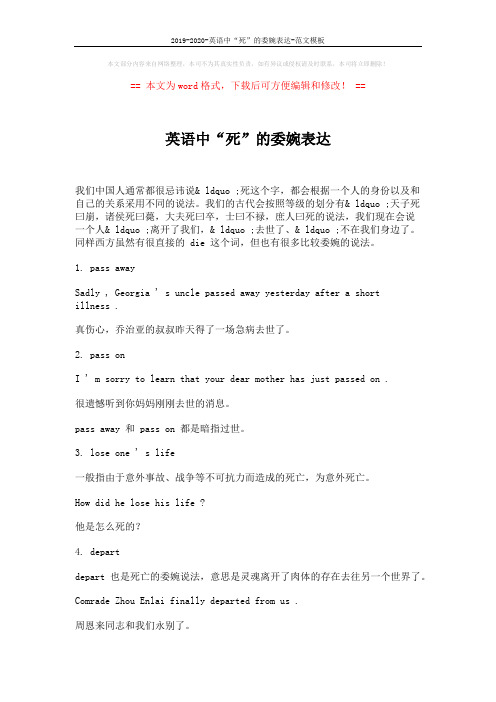
2019-2020-英语中“死”的委婉表达-范文模板本文部分内容来自网络整理,本司不为其真实性负责,如有异议或侵权请及时联系,本司将立即删除!== 本文为word格式,下载后可方便编辑和修改! ==英语中“死”的委婉表达我们中国人通常都很忌讳说& ldquo ;死这个字,都会根据一个人的身份以及和自己的关系采用不同的说法。
我们的古代会按照等级的划分有& ldquo ;天子死曰崩,诸侯死曰薨,大夫死曰卒,士曰不禄,庶人曰死的说法,我们现在会说一个人& ldquo ;离开了我们,& ldquo ;去世了、& ldquo ;不在我们身边了。
同样西方虽然有很直接的 die 这个词,但也有很多比较委婉的说法。
1. pass awaySadly , Georgia ' s uncle passed away yesterday after a shortillness .真伤心,乔治亚的叔叔昨天得了一场急病去世了。
2. pass onI ' m sorry to learn that your dear mother has just passed on .很遗憾听到你妈妈刚刚去世的消息。
pass away 和 pass on 都是暗指过世。
3. lose one ' s life一般指由于意外事故、战争等不可抗力而造成的死亡,为意外死亡。
How did he lose his life ?他是怎么死的?4. departdepart 也是死亡的委婉说法,意思是灵魂离开了肉体的存在去往另一个世界了。
Comrade Zhou Enlai finally departed from us .周恩来同志和我们永别了。
双语:西方关于死亡的七种委婉说法
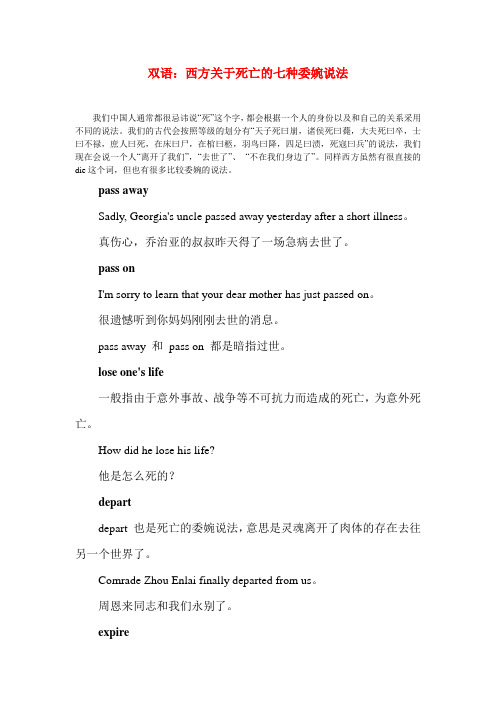
双语:西方关于死亡的七种委婉说法我们中国人通常都很忌讳说“死”这个字,都会根据一个人的身份以及和自己的关系采用不同的说法。
我们的古代会按照等级的划分有“天子死曰崩,诸侯死曰薨,大夫死曰卒,士曰不禄,庶人曰死,在床曰尸,在棺曰柩,羽鸟曰降,四足曰渍,死寇曰兵”的说法,我们现在会说一个人“离开了我们”,“去世了”、“不在我们身边了”。
同样西方虽然有很直接的die这个词,但也有很多比较委婉的说法。
pass awaySadly, Georgia's uncle passed away yesterday after a short illness。
真伤心,乔治亚的叔叔昨天得了一场急病去世了。
pass onI'm sorry to learn that your dear mother has just passed on。
很遗憾听到你妈妈刚刚去世的消息。
pass away 和pass on 都是暗指过世。
lose one's life一般指由于意外事故、战争等不可抗力而造成的死亡,为意外死亡。
How did he lose his life?他是怎么死的?departdepart 也是死亡的委婉说法,意思是灵魂离开了肉体的存在去往另一个世界了。
Comrade Zhou Enlai finally departed from us。
周恩来同志和我们永别了。
expireexpire的意思是呼气,这里引申为呼出最后一口气,暗指死亡。
The patient expired early this morning。
这位病人今天早晨去世了。
perishperish 指的是非自然死亡。
Many soldiers perish in battle。
很多士兵在战斗中死去了。
go to meet one’s Maker注意这个Maker要大写,有造物主的意思,所以去见造物主了就是灵魂回归了,也就是死亡的委婉说法,就像我们也会说某人“去见马克思了”。
- 1、下载文档前请自行甄别文档内容的完整性,平台不提供额外的编辑、内容补充、找答案等附加服务。
- 2、"仅部分预览"的文档,不可在线预览部分如存在完整性等问题,可反馈申请退款(可完整预览的文档不适用该条件!)。
- 3、如文档侵犯您的权益,请联系客服反馈,我们会尽快为您处理(人工客服工作时间:9:00-18:30)。
我们中国人通常都很忌讳说“死”这个字,都会根据一个人的身份以及和自己的关系采用不同的说法。
我们的古代会按照等级的划分有“天子死曰崩,诸侯死曰薨,大夫死曰卒,士曰不禄,庶人曰死,在床曰尸,在棺曰柩,羽鸟曰降,四足曰渍,死寇曰兵”的说法,我们现在会说一个人“离开了我们”,“去世了”、“不在我们身边了”。
同样西方虽然有很直接的die这个词,但也有很多比较委婉的说法。
pass away
Sadly, Georgia's uncle passed away yesterday after a short illness。
真伤心,乔治亚的叔叔昨天得了一场急病去世了。
pass on
I'm sorry to learn that your dear mother has just passed on。
很遗憾听到你妈妈刚刚去世的消息。
pass away 和 pass on 都是暗指过世。
lose one's life
一般指由于意外事故、战争等不可抗力而造成的死亡,为意外死亡。
How did he lose his life?
他是怎么死的?
depart
depart 也是死亡的委婉说法,意思是灵魂离开了肉体的存在去往另一个世界了。
Comrade Zhou Enlai finally departed from us。
周恩来同志和我们永别了。
expire
expire的意思是呼气,这里引申为呼出最后一口气,暗指死亡。
The patient expired early this morning。
这位病人今天早晨去世了。
perish
perish 指的是非自然死亡。
Many soldiers perish in battle。
很多士兵在战斗中死去了。
go to meet one’s Maker
注意这个Maker要大写,有造物主的意思,所以去见造物主了就是灵魂回归了,也就是死亡的委婉说法,就像我们也会说某人“去见马克思了”。
He knew that he came into the world with nothing and that he would go to meet his Maker with empty hands。
他知道他是一无所有的来到世上,也将会两手空空的离开人间。
